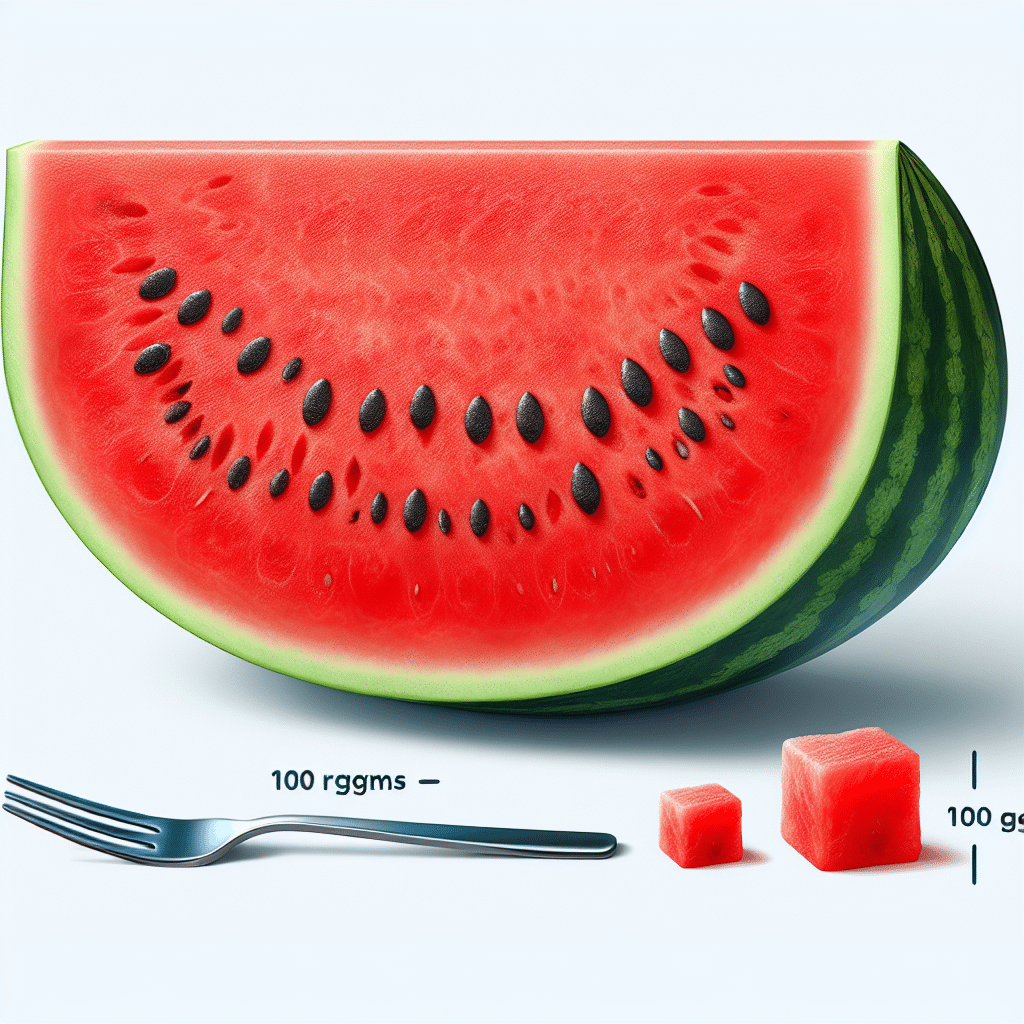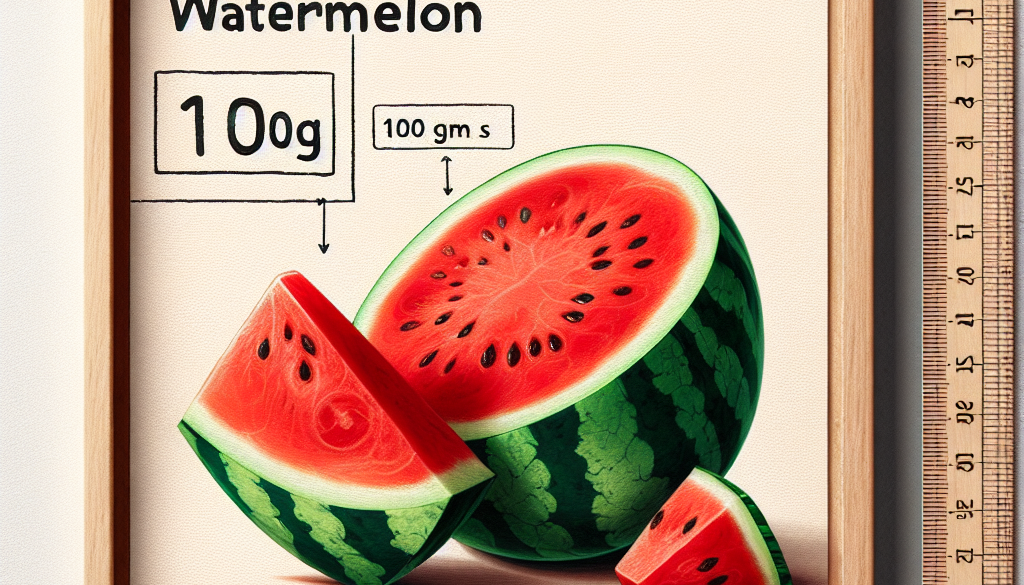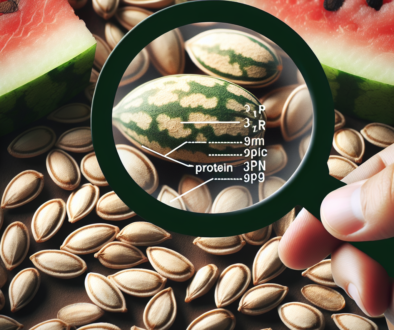100 Grams Watermelon Look Like: Size Matters
-
Table of Contents
- Watermelon Serving Size Visualized: What Does 100 Grams Look Like?
- Visualizing 100 Grams of Watermelon
- The Importance of Portion Size
- Nutritional Profile of 100 Grams of Watermelon
- Case Studies and Statistics: The Impact of Portion Size
- Practical Tips for Measuring Portions
- Conclusion: The Significance of Knowing Your Portions
- Discover ETprotein’s Watermelon Seed Protein Products
Watermelon Serving Size Visualized: What Does 100 Grams Look Like?

Watermelon is a refreshing and hydrating fruit that’s not only delicious but also packed with nutrients. Understanding portion sizes can be crucial for those monitoring their food intake, whether for dietary, health, or culinary reasons. In this article, we’ll explore what 100 grams of watermelon looks like, why size matters, and how this knowledge can be beneficial.
Visualizing 100 Grams of Watermelon
When it comes to visualizing food portions, size and weight can be abstract without a point of reference. So, what does 100 grams of watermelon look like? Typically, 100 grams of watermelon equates to roughly one cup of diced pieces or a slice that’s about the size of a standard deck of cards. However, this can vary slightly depending on the size of the watermelon chunks or slices.
The Importance of Portion Size
Understanding portion sizes is essential for several reasons:
- Nutritional Balance: Knowing how much you’re consuming helps maintain a balanced diet.
- Weight Management: Portion control is a key factor in managing weight, whether you’re looking to lose, gain, or maintain it.
- Diabetes Control: For individuals with diabetes, portion sizes can impact blood sugar levels.
- Culinary Precision: Chefs and home cooks alike need to measure ingredients accurately for recipes to turn out as intended.
Nutritional Profile of 100 Grams of Watermelon
Watermelon is not only low in calories but also rich in vitamins, minerals, and antioxidants. A 100-gram serving contains:
- Approximately 30 calories
- 0.6 grams of dietary fiber
- 7.6 grams of carbohydrates
- 0.2 grams of fat
- 0.6 grams of protein
- High levels of vitamin C, vitamin A, and potassium
- Lycopene, an antioxidant linked to heart health and cancer prevention
This nutritional makeup makes watermelon a great choice for a healthy snack or a sweet treat without the guilt.
Case Studies and Statistics: The Impact of Portion Size
Research has shown that portion sizes can significantly impact eating habits and health. For example, a study published in the ‘American Journal of Clinical Nutrition’ found that when participants were offered larger portions, they consumed more food without realizing it. This unintentional increase in consumption can lead to weight gain over time.
Another study highlighted the “portion size effect,” where individuals eat more when presented with larger portions, regardless of hunger levels. This suggests that visual cues play a substantial role in how much we eat.
Practical Tips for Measuring Portions
Here are some practical ways to measure and visualize 100 grams of watermelon:
- Use a kitchen scale to weigh your watermelon slice or chunks.
- Compare the size of your watermelon portion to everyday objects, like a deck of cards.
- Use measuring cups to scoop out a cup of diced watermelon, which is roughly equivalent to 100 grams.
These methods can help ensure you’re consuming the amount you intend to, whether for health reasons or recipe accuracy.
Conclusion: The Significance of Knowing Your Portions
Understanding what 100 grams of watermelon looks like is more than just a fun fact; it’s a tool for better health and culinary success. By being mindful of portion sizes, you can enjoy watermelon’s sweet taste and health benefits without overindulging. Remember, when it comes to food, size does matter, and being informed is the key to making smarter choices.
Discover ETprotein’s Watermelon Seed Protein Products
If you’re interested in incorporating watermelon into your diet in a unique way, consider ETprotein’s watermelon seed protein products. These high-quality, organic proteins are an excellent addition to any health-conscious individual’s pantry. Whether you’re looking to enhance your smoothies, baked goods, or savory dishes, ETprotein offers a versatile and nutritious option that aligns with a variety of dietary needs.
About ETprotein:
ETprotein, a reputable watermelon seed protein Chinese factory manufacturer and supplier, is renowned for producing, stocking, exporting, and delivering the highest quality organic bulk vegan protein and plant proteins. They include Organic rice protein, clear rice protein, pea protein, clear pea protein, watermelon seed protein, pumpkin seed protein, sunflower seed protein, mung bean protein, peanut protein, etc. Their offerings, characterized by a neutral taste, non-GMO, allergen-free attributes, cater to a diverse range of industries. They serve nutraceutical, pharmaceutical, cosmeceutical, veterinary, as well as food and beverage finished product distributors, traders, and manufacturers across Europe, USA, Canada, Australia, Thailand, Japan, Korea, Brazil, and Chile, among others.
ETprotein specialization includes exporting and delivering tailor-made protein powder and finished nutritional supplements. Their extensive product range covers sectors like Food and Beverage, Sports Nutrition, Weight Management, Dietary Supplements, Health and Wellness Products, and Infant Formula, ensuring comprehensive solutions to meet all your protein needs.
As a trusted company by leading global food and beverage brands and Fortune 500 companies, ETprotein reinforces China’s reputation in the global arena. For more information or to sample their products, please contact them and email sales(at)ETprotein.com today.












